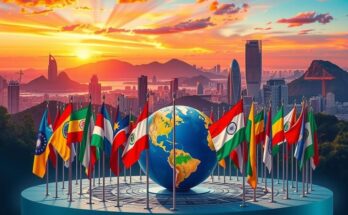Violence surged in the DRC as rebels captured Goma, leading to humanitarian crises and regional tensions. The M23 group has expanded its territorial influence, prompting government protests against neighboring Rwanda, which is accused of supporting the rebels. The ongoing conflict exacerbates the longstanding instability in the region, impacting vital resources and displacing thousands of civilians.
This week, violence escalated in the mineral-rich eastern region of the Democratic Republic of Congo (DRC) as a rebel alliance captured the significant city of Goma. The Alliance Fleuve Congo (AFC), which includes the M23 group, successfully pushed back government troops supported by regional and UN forces. Goma’s fall signifies a troubling expansion of AFC’s influence, exacerbating a longstanding humanitarian crisis in the area where vital minerals are mined for technology production.
Victor Tesongo, an AFC spokesperson, confirmed that “AFC-M23 controls Goma,” indicating that the city was overtaken following earlier conquests of nearby towns. Despite the takeover not being officially acknowledged by the Congolese government, it did recognize the rebels’ presence, which led to severed diplomatic ties with Rwanda due to accusations of military support for the rebels. Meanwhile, as violence increased, reports indicated the deaths of several foreign peacekeepers and the military governor of North Kivu, creating a mass exodus of locals fleeing the conflict.
Recent developments revealed that South Africa’s military reported the deaths of additional soldiers participating in the UN peacekeeping mission, which added to the toll of nine troops lost just days prior. Aid organizations are struggling to accommodate the influx of casualties in hospitals, with many civilians wounded and dead bodies reported in the streets. Notably, the esteemed Congolese boxer Balezi Bagunda was among the fatalities, as activists worked tirelessly to evacuate children from the region.
In the capital, Kinshasa, anti-government protests flared with demonstrators targeting embassies, including the French embassy, which was firebombed without breaching perimeter security. Amid ongoing violence, gunfire erupted at Goma’s airport, which the rebels had reportedly seized control of. Additionally, numerous prisoners escaped a correctional facility situated in the chaos accompanying the takeover of Goma.
The longstanding conflict is rooted in decades of militia violence in the DRC, primarily fueled by M23’s claims of defending Rwandophone minorities. After a renewed offensive began last year, the rebels have significantly expanded their control in North Kivu, particularly over lucrative mining areas vital for global technology. The UN has indicated that economic competition regarding these resources has heightened tensions among warring factions.
Goma’s strategic importance cannot be understated; it is a densely populated urban center with key transportation links to Rwanda. M23’s spokesperson claims their actions are for the liberation of the city’s distressed inhabitants. Political analysts express concern that losing Goma would symbolize the total destabilization of Eastern DRC, marked by extensive human rights violations attributed to M23.
As thousands remain displaced due to ongoing conflict, humanitarian agencies have raised alarms about dire conditions in Goma and its surrounding regions, with urgent needs for food, clean water, and medical care reported. The risks of the situation intensifying underscore the urgency for immediate international intervention as local resources become increasingly strained.
Rwanda’s involvement in the conflict has also sparked significant geopolitical tension, with estimates suggesting that thousands of Rwandan soldiers support M23. Rwanda asserts it is merely defending its borders amidst accusations from the Congolese government of military collaboration against rebels. The escalating rhetoric from both governments raises concerns of a broader conflict, complicated by historical context related to ethnic tensions.
Regional leaders have initiated emergency meetings aimed at finding resolutions amid escalating violence, though previous interventions have often failed to achieve lasting peace. Analysts maintain that a comprehensive and sustainable solution will require structural reforms and effective governance within the DRC to stabilize security and economic control over its resources.
The Democratic Republic of Congo (DRC) has been embroiled in conflict for decades, primarily driven by various militia groups vying for control over valuable natural resources. The M23 armed group, claiming to represent the Rwandophone community, has relaunched hostilities against the Congolese government since 2022. This ongoing violence encompasses broader historical grievances, ethnic tensions, and significant regional geopolitical implications, particularly concerning Rwanda’s involvement in the DRC’s internal strife. Goma, as a vital urban center rich in natural resources, has become a focal point in this conflict. The city is critical not only for its population but also for its strategic transportation links and proximity to Rwanda. Control over Goma signifies a potential shift in power dynamics within the region, affecting countless residents and the humanitarian situation. UN officials have attributed escalating violence to competition over resource exploitation, which has further complicated efforts toward peace and stability.
The conflict in Eastern DRC remains a complex and urgent humanitarian crisis, particularly highlighted by the recent capture of Goma by the AFC coalition, including M23. The escalation of violence has led to significant civilian casualties and a mass displacement crisis. Efforts to establish peace remain tenuous, hindered by regional tensions and the entrenched interests of various armed groups. Without swift and effective intervention, the humanitarian conditions are likely to worsen, further destabilizing the region.
Original Source: www.cnn.com




